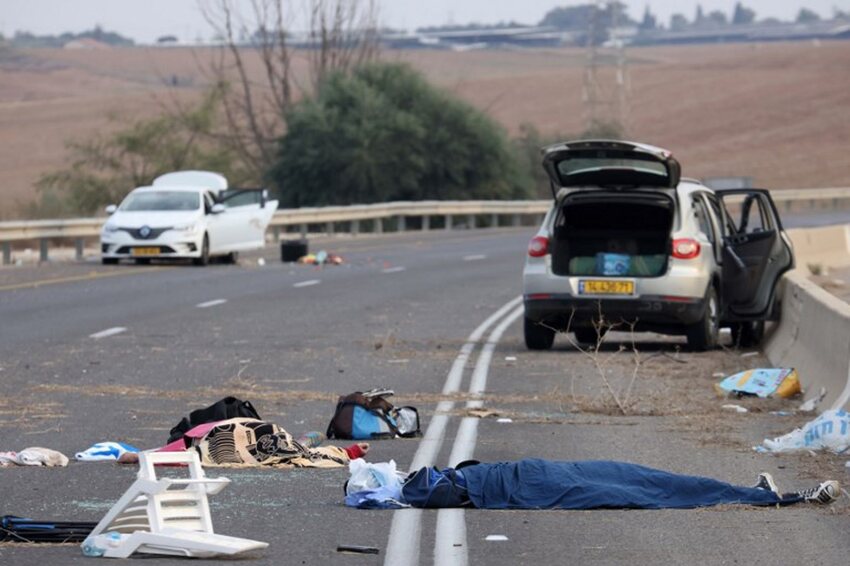An attack launched on Saturday morning by Hamas, the terrorist organization which is ruling Gaza, took Israel with surprise and has claimed the lives of more than 40 Israelis and left more than 500 wounded. No Palestinian casualties have been reported so far.
The attack took place almost on the day 50 years after the October war in 1973, another but different surprise attack by Egypt. Under the coverage of more than 2,000 rockets, Hamas militants infiltrated Israel, some by air on hang-gliders or by sea, others by breaching the border fence with Israel. Reportedly hundreds of militants attacked about 15 locations simultaneously.
They penetrated into towns and villages in southern Israel in pick-up trucks and wrought havoc, killed civilians and police men, and reportedly took hostages. It took the Israeli army several hours to mobilize troops and send them to the places that were attacked. An area with a radius of 80 km in southern Israel has been closed off and the population there has been told stay inside and near shelters.
While the fighting is still on-going, questions have already been asked how it could happen, considering the tense security situation in Israel and the threats by Hamas to escalate in case of what they see as Israeli provocations in Jerusalem and the West Bank.
The prevailing view in the Israeli intelligence community was that Hamas had no interest in starting a full-scale war. The assumption was that economic relief in the form of cash payments from Qatar and an increase in the number permits for Palestinians workers to work in Israel would calm down the situation.
This proved to be totally wrong as the attack by Hamas must have required lengthy preparation which went under the Israeli radar. The brazen attack also confirmed the concerns that the on-going internal crisis in Israel and the mass demonstrations against the government’s judicial overhaul has damaged its deterrence and weakened its military preparedness.
Israeli pilots and reservists in the army have protested against the judicial overhaul by announcing that their conscience forbids them to enlist in a war if it would be declared by a government which undermines democracy and the rule of law. Defending Israel against an unprovoked attack by Hamas is a different matter and all protests have been cancelled for the time being.
In his remarks at the start of the Israeli security cabinet meeting today several hours after the attack became known, Prime Minister Benjamin Netanyahu said that, “Since this morning, the State of Israel has been at war. Our first objective is to clear out the hostile forces that infiltrated our territory and restore the security and quiet to the communities that have been attacked.”
“The second objective, at the same time, is to exact an immense price from the enemy, within the Gaza Strip as well. The third objective is to reinforce other fronts so that nobody should mistakenly join this war.”
Israeli planes have already started to bomb targets in the Gaza Strip but not with the full force as could have been expected. A military spokesperson stressed the first objective and declined to reply to questions as to why Hamas could infiltrate Israel so easily and why the Israeli counter-measures are not carried out in parallel.
In previous rounds of hostilities in the past between Hamas and Israel, Israel was reluctant to escalate the fighting by launching a ground offensive into Gaza.
Israel faces a dilemma because continued air strikes might jeopardize the lives of any hostages taken by Hamas. On the other hand, if it does not respond, Hezbollah in the north might also feel tempted to think that they can attack Israel with impunity. Such an attack would hit all Israel because of Hezbollah’s arsenal of long-range rockets.
Contrary to previous rounds, which escalated and erupted by provocation by both sides in a tit for tat, this time the fighting started by an unprovoked attack by Hamas, though under the same pretext of defending the Al-Aqsa Mosque in Jerusalem. The international community appears as startled and surprised as Israel and has rallied to its side.
EU’s foreign policy chief, High Representative Josep Borrell, tweeted on Saturday morning on X that, “We follow with anguish the news coming from Israel. We unequivocally condemn the attacks by Hamas. This horrific violence must stop immediately. Terrorism and violence solve nothing. The EU expresses its solidarity with Israel in these difficult moments.”
M. Apelblat
The Brussels Times

